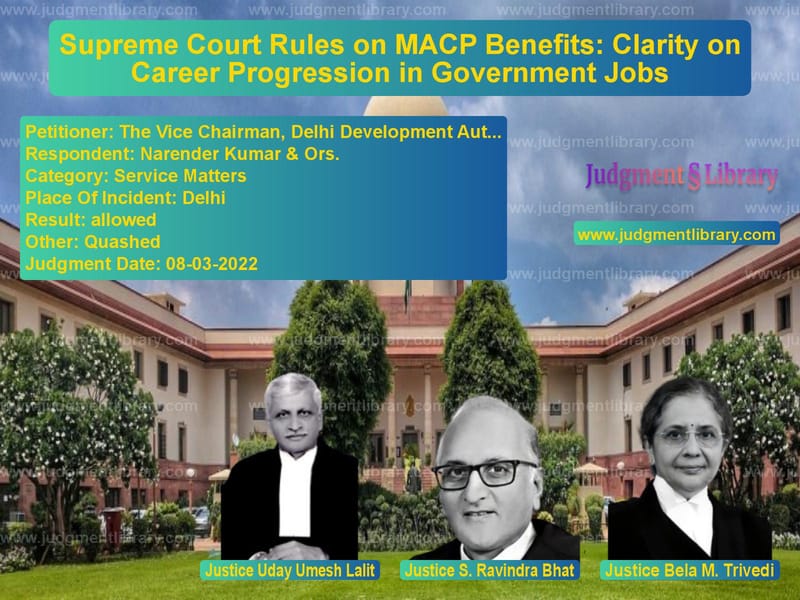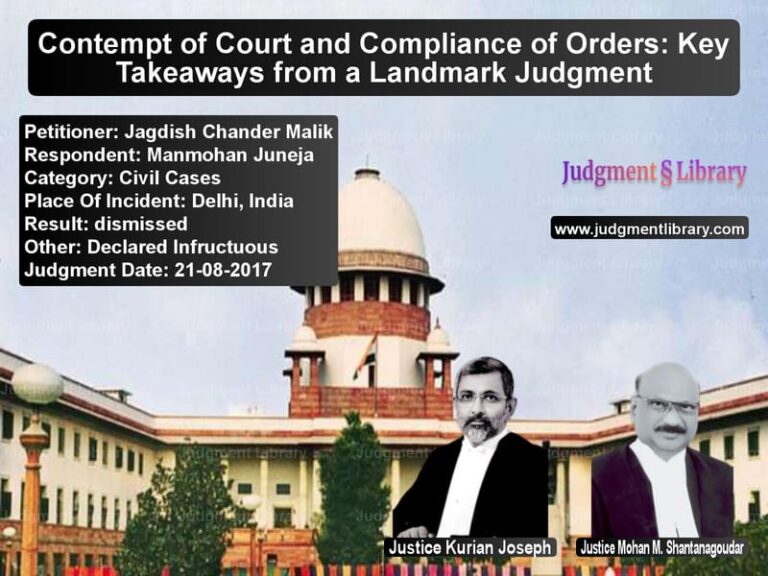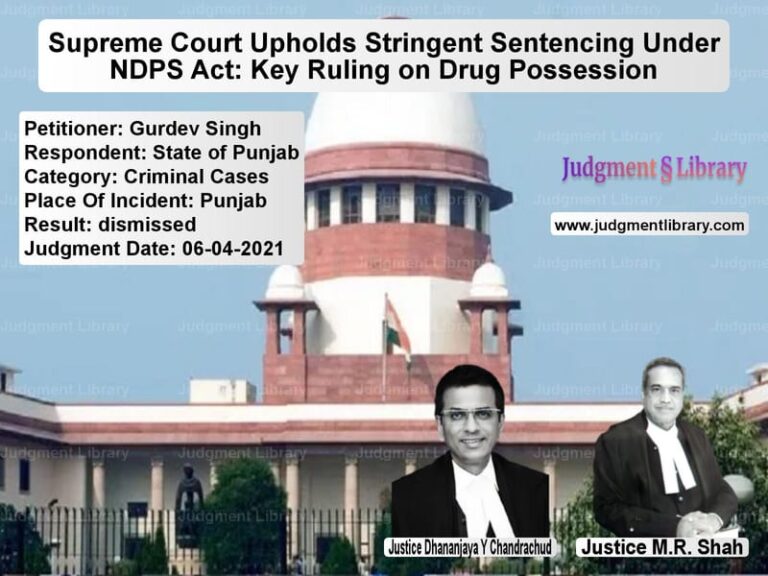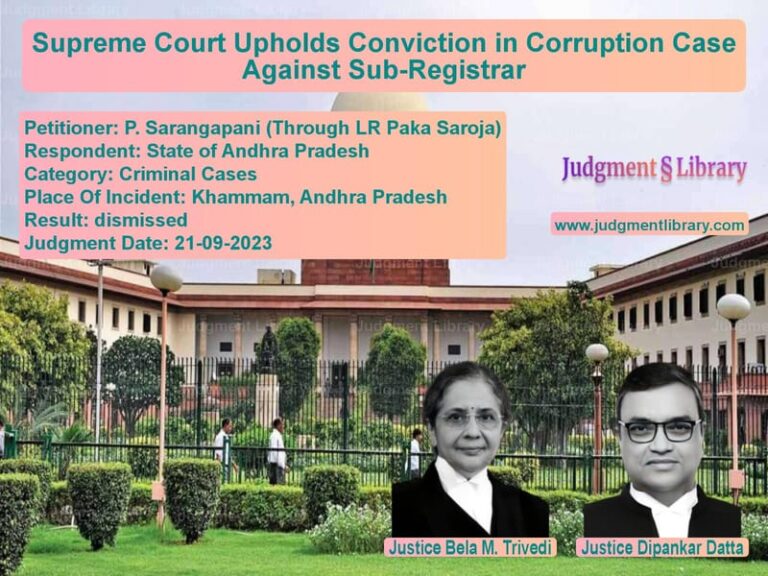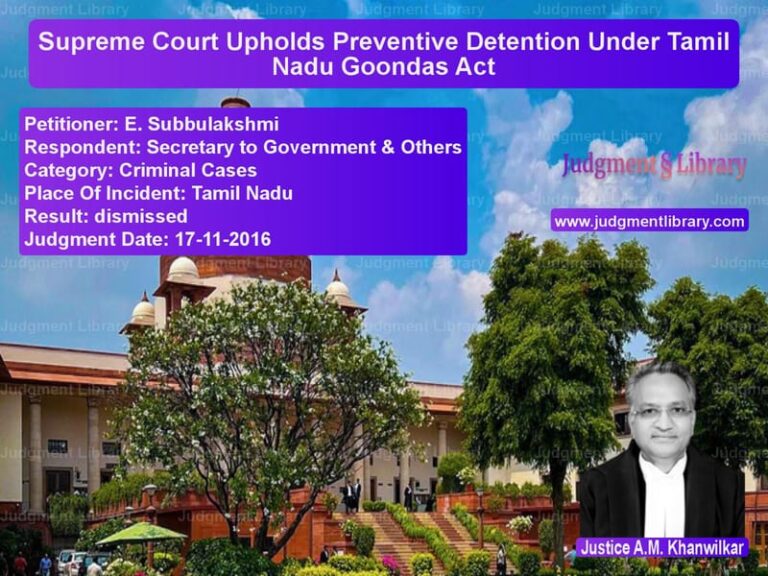Supreme Court Rules on MACP Benefits: Clarity on Career Progression in Government Jobs
The case of The Vice Chairman, Delhi Development Authority vs. Narender Kumar & Ors. is a significant ruling concerning career progression and pay benefits under the Modified Assured Career Progression (MACP) Scheme for government employees. The Supreme Court’s judgment clarifies whether the MACP scheme should be applied retrospectively from January 1, 2006, or prospectively from September 1, 2008.
This appeal was filed by the Delhi Development Authority (DDA), challenging the Delhi High Court’s ruling that MACP benefits should be extended from January 1, 2006, instead of September 1, 2008. The Supreme Court overturned the High Court’s decision, holding that the MACP scheme was correctly implemented from September 1, 2008.
Background of the Case
The dispute arose when a group of DDA employees, who were entitled to financial upgradation under the previous Assured Career Progression (ACP) Scheme, argued that they should be granted ACP benefits since their eligibility arose before the MACP scheme was introduced. The Government of India had introduced the ACP Scheme in August 1999 to address stagnation in government jobs by providing two financial upgradations after 12 and 24 years of service. In 2008, the government replaced the ACP with the MACP scheme, which offered three upgradations after 10, 20, and 30 years.
The central issue in the case was:
- Whether the MACP scheme should be applied from January 1, 2006, as recommended by the Sixth Pay Commission, or from September 1, 2008, as per the government’s notification.
- Whether employees who became eligible for the second ACP before the introduction of MACP should be granted ACP benefits instead of MACP benefits.
Arguments Presented by the Petitioner (Delhi Development Authority)
The DDA contended:
- The MACP scheme was officially notified on May 19, 2009, and was made applicable from September 1, 2008.
- Employees who completed 24 years of service after September 1, 2008, were only eligible for MACP benefits, not ACP benefits.
- The Delhi High Court incorrectly relied on the Supreme Court’s decision in Union of India vs. Balbir Singh Turn (2018), which applied only to Armed Forces personnel.
- Allowing MACP benefits from January 1, 2006, would create financial and administrative burdens.
Arguments Presented by the Respondent (Employees)
The employees argued:
- They were eligible for the second ACP upgradation in early 2009, before the MACP scheme was formally notified.
- The MACP scheme was intended as a replacement for ACP, but it should not take away benefits that had already vested.
- They relied on Clause 9 of the MACP scheme, which stated that financial upgradations under the ACP would continue until August 31, 2008.
- The Delhi High Court was correct in interpreting that MACP should be applied from January 1, 2006, in line with the Sixth Pay Commission recommendations.
Supreme Court’s Observations and Verdict
The Supreme Court carefully analyzed the provisions of the ACP and MACP schemes and ruled that:
- The MACP scheme clearly stated that it would apply prospectively from September 1, 2008, and not from January 1, 2006.
- The decision in Balbir Singh Turn was specific to Armed Forces personnel and could not be applied to civilian employees.
- The MACP scheme was designed to benefit a larger number of employees by introducing an additional third upgradation.
- Allowing ACP benefits beyond August 31, 2008, would contradict the express terms of the MACP scheme.
- The High Court’s order directing MACP benefits from January 1, 2006, was incorrect and set aside.
Based on these findings, the Supreme Court ruled:
- The appeal was allowed.
- The Delhi High Court’s order extending MACP from January 1, 2006, was quashed.
- The MACP scheme would apply from September 1, 2008, as per the government’s notification.
- Employees who became eligible for ACP before September 1, 2008, would get ACP benefits; those who became eligible after that date would only receive MACP benefits.
Legal Precedents Considered
The Supreme Court referred to multiple judgments on service benefits and government pay policies:
- Union of India vs. Balbir Singh Turn (2018): Applied only to Armed Forces personnel regarding pay benefits from the Sixth Pay Commission.
- M.V. Mohanan Nair vs. Union of India (2020): Held that MACP was an incentive, not a regular promotion.
- R.K. Sharma vs. Union of India (2021): Confirmed that MACP benefits would apply only from September 1, 2008.
Impact of the Judgment
This ruling has significant implications for government employees and pay policies:
- It confirms that MACP benefits cannot be claimed from January 1, 2006, unless explicitly provided for in the government notification.
- It prevents administrative confusion by setting a clear cutoff date for MACP implementation.
- It ensures that employees who were eligible for ACP before September 1, 2008, do not lose their entitled benefits.
- It reinforces that courts should not interfere in executive policy decisions related to pay and service benefits unless they are arbitrary or discriminatory.
By upholding the prospective implementation of the MACP scheme, the Supreme Court has provided clarity on career progression policies in government jobs and reinforced the principle of judicial restraint in administrative matters.
Petitioner Name: The Vice Chairman, Delhi Development Authority.Respondent Name: Narender Kumar & Ors..Judgment By: Justice Uday Umesh Lalit, Justice S. Ravindra Bhat, Justice Bela M. Trivedi.Place Of Incident: Delhi.Judgment Date: 08-03-2022.
Don’t miss out on the full details! Download the complete judgment in PDF format below and gain valuable insights instantly!
Download Judgment: the-vice-chairman,-d-vs-narender-kumar-&-ors-supreme-court-of-india-judgment-dated-08-03-2022.pdf
Directly Download Judgment: Directly download this Judgment
See all petitions in Promotion Cases
See all petitions in Pension and Gratuity
See all petitions in Judgment by Uday Umesh Lalit
See all petitions in Judgment by S Ravindra Bhat
See all petitions in Judgment by Bela M. Trivedi
See all petitions in allowed
See all petitions in Quashed
See all petitions in supreme court of India judgments March 2022
See all petitions in 2022 judgments
See all posts in Service Matters Category
See all allowed petitions in Service Matters Category
See all Dismissed petitions in Service Matters Category
See all partially allowed petitions in Service Matters Category

